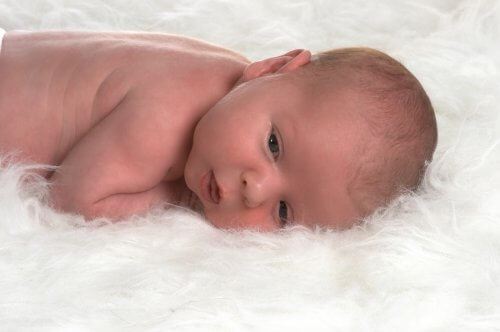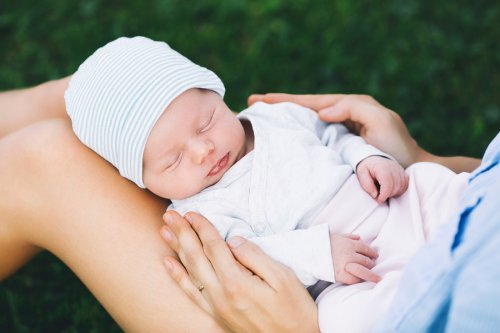Caring for Your Newborn Baby's Skin


Reviewed and approved by the doctor Nelton Ramos
A newborn baby’s skin is very different from that of an adult – it’s both smoother and much more delicate. Taking proper care of your baby’s skin is very important.
In this article, we’ll provide tips on how to care for your little one’s skin to avoid irritations.
Tips for caring for your newborn baby’s skin
A newborn baby’s skin is very vulnerable, and more delicate than that of adults. This means that it requires special care. Read the following advice in order to provide the care your little one’s dermis needs:
1. Wash with neutral soap
In stores and pharmacies, there are many options when it comes to baby soaps. But, you can also use plain neutral soap or glycerin soap. Consult your pediatrician to find out which one he or she considers best for your baby. Stay away from soaps that contain perfumes or have an acidic pH.
Also remember that during the first days of life, you cannot fully bathe your baby. You should wait until his or her umbilical cord falls off first. In the meantime, you can give your newborn a sponge bath using a damp, soapy wash cloth.
2. Keep skin hydrated
It’s true that a newborn baby’s skin is more hydrated than that of adults. Just the same, when it comes to newborns, there’s no need to apply any sort of lotion – even if it’s made for babies.
When babies are born, their skin is covered by a protective layer known as vernix caseosa. However, this “coating” will go away over time and as soon as you begin to bathe your little one.
That’s when you should find good hydrating products that are specifically designed for babies. You can choose from both lotions and oils. Pay special attention to any signs that may indicate allergy or irritations. If you observe any symptoms, suspend use and consult a doctor.

There are areas of a baby’s body that need more hydration than others. These include the chin, bottom, behind the ears and any area where folds form.
3. Protect your newborn from the sun
This is one of the most important skin care tips you must remember when it comes to newborns, even in winter. During their first months of life, their skin doesn’t have enough melanocytes (melanin-producing cells) to protect against sun rays. Furthermore, there are no protective lotions or sunscreen factors that are safe for babies under the age of 6 months.
Therefore, don’t expose your baby to the sun or take him or her to the beach. If you’re on an outing, cover your little one completely with long-sleeved clothing and a cap.
4. Don’t bathe your newborn every day
Small babies don’t get as dirty as older children. Therefore, there’s no need to bathe newborn babies every day. Not only should you wait until the umbilical cord falls off to give your little one a full bath, but you should also skip a day or two between each bath.
If needed, you can wash up specific areas of your baby’s body – especially in summer when he or she may sweat while sleeping.
“Remember that during the first days of life, you cannot fully bathe your baby. You should wait until his or her umbilical cord falls off first.”
5. Massage your baby’s skin
In order for your newborn baby’s skin to be even more soft and beautiful, nothing’s better than a good massage using suitable lotion or oil. What’s more, this is the perfect opportunity to strengthen your bond with your little one.
You can massage your baby at night, just before bedtime, or you can use it as a calming technique when your baby won’t stop crying.
6. Don’t put off diaper changes
Another important step when it comes to caring for a newborn baby’s skin has to do with the diaper region. If you don’t change your baby’s diaper often when it’s wet or soiled, then your little one runs the risk of diaper rash, irritation and other problems.
Don’t let too much time go by once you notice that your baby has peed or pooped. Change your baby’s diaper as soon as possible, using wet wipes or cotton to clean your baby’s genitals and bottom.
Pay special attention to your little one’s folds. Finally, wait until your baby’s skin is dry before putting on a clean diaper.

7. Choose clothing made of natural fibers
Anything and everything that comes in contact with a newborn baby’s skin can cause irritation and allergy. From the first days of life, we recommend choosing clothing made of cotton or any other natural fiber.
It’s also important that they don’t contain chemical substances. You should wash them by hand with neutral soap and avoid any tags or seams that can bother your little one’s sensitive skin.
If you follow the advice in today’s article and practice proper care in regards to your newborn baby’s skin, you’ll avoid issues like dermatitis, allergies and the like.
When it comes to your precious baby, do everything you can to assure his or her comfort and well-being.
A newborn baby’s skin is very different from that of an adult – it’s both smoother and much more delicate. Taking proper care of your baby’s skin is very important.
In this article, we’ll provide tips on how to care for your little one’s skin to avoid irritations.
Tips for caring for your newborn baby’s skin
A newborn baby’s skin is very vulnerable, and more delicate than that of adults. This means that it requires special care. Read the following advice in order to provide the care your little one’s dermis needs:
1. Wash with neutral soap
In stores and pharmacies, there are many options when it comes to baby soaps. But, you can also use plain neutral soap or glycerin soap. Consult your pediatrician to find out which one he or she considers best for your baby. Stay away from soaps that contain perfumes or have an acidic pH.
Also remember that during the first days of life, you cannot fully bathe your baby. You should wait until his or her umbilical cord falls off first. In the meantime, you can give your newborn a sponge bath using a damp, soapy wash cloth.
2. Keep skin hydrated
It’s true that a newborn baby’s skin is more hydrated than that of adults. Just the same, when it comes to newborns, there’s no need to apply any sort of lotion – even if it’s made for babies.
When babies are born, their skin is covered by a protective layer known as vernix caseosa. However, this “coating” will go away over time and as soon as you begin to bathe your little one.
That’s when you should find good hydrating products that are specifically designed for babies. You can choose from both lotions and oils. Pay special attention to any signs that may indicate allergy or irritations. If you observe any symptoms, suspend use and consult a doctor.

There are areas of a baby’s body that need more hydration than others. These include the chin, bottom, behind the ears and any area where folds form.
3. Protect your newborn from the sun
This is one of the most important skin care tips you must remember when it comes to newborns, even in winter. During their first months of life, their skin doesn’t have enough melanocytes (melanin-producing cells) to protect against sun rays. Furthermore, there are no protective lotions or sunscreen factors that are safe for babies under the age of 6 months.
Therefore, don’t expose your baby to the sun or take him or her to the beach. If you’re on an outing, cover your little one completely with long-sleeved clothing and a cap.
4. Don’t bathe your newborn every day
Small babies don’t get as dirty as older children. Therefore, there’s no need to bathe newborn babies every day. Not only should you wait until the umbilical cord falls off to give your little one a full bath, but you should also skip a day or two between each bath.
If needed, you can wash up specific areas of your baby’s body – especially in summer when he or she may sweat while sleeping.
“Remember that during the first days of life, you cannot fully bathe your baby. You should wait until his or her umbilical cord falls off first.”
5. Massage your baby’s skin
In order for your newborn baby’s skin to be even more soft and beautiful, nothing’s better than a good massage using suitable lotion or oil. What’s more, this is the perfect opportunity to strengthen your bond with your little one.
You can massage your baby at night, just before bedtime, or you can use it as a calming technique when your baby won’t stop crying.
6. Don’t put off diaper changes
Another important step when it comes to caring for a newborn baby’s skin has to do with the diaper region. If you don’t change your baby’s diaper often when it’s wet or soiled, then your little one runs the risk of diaper rash, irritation and other problems.
Don’t let too much time go by once you notice that your baby has peed or pooped. Change your baby’s diaper as soon as possible, using wet wipes or cotton to clean your baby’s genitals and bottom.
Pay special attention to your little one’s folds. Finally, wait until your baby’s skin is dry before putting on a clean diaper.

7. Choose clothing made of natural fibers
Anything and everything that comes in contact with a newborn baby’s skin can cause irritation and allergy. From the first days of life, we recommend choosing clothing made of cotton or any other natural fiber.
It’s also important that they don’t contain chemical substances. You should wash them by hand with neutral soap and avoid any tags or seams that can bother your little one’s sensitive skin.
If you follow the advice in today’s article and practice proper care in regards to your newborn baby’s skin, you’ll avoid issues like dermatitis, allergies and the like.
When it comes to your precious baby, do everything you can to assure his or her comfort and well-being.
All cited sources were thoroughly reviewed by our team to ensure their quality, reliability, currency, and validity. The bibliography of this article was considered reliable and of academic or scientific accuracy.
- Dumet J, Prado Z, Rivitti M. Children and newborn skin care and prevention. An Bras Dermatol. 2011; 86 (1): 102-10.
- Sarkar, Rashmi & Basu, Srikanta & K Agrawal, R & Gupta, Piyush. (2010). Skin Care for the Newborn. Indian pediatrics. 47. 593-8. 10.1007/s13312-010-0132-0.
This text is provided for informational purposes only and does not replace consultation with a professional. If in doubt, consult your specialist.








